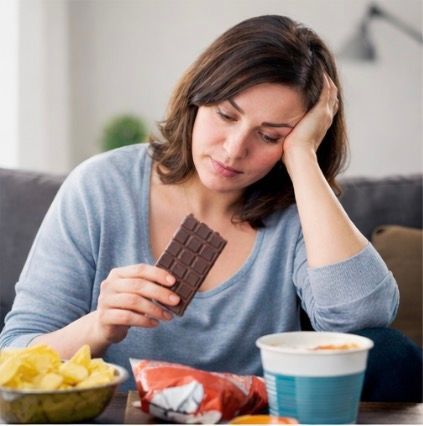Why You Still Feel Hungry After Eating: The Emotional Link
Have you ever eaten a full meal but still felt hungry?
Your stomach says you’re full, but your mind says,
“Maybe I need a snack.”
Don’t worry, you’re not the only one! This happens to many people. And most of the time, it’s not your stomach that’s hungry.
It’s your
feelings.
Let’s talk about why this happens and how you can feel better without always eating more food.
1. Two Kinds of Hunger
There are two types of hunger:
Physical Hunger
This is when your body truly needs food.
- It comes slowly.
- You can eat any kind of food and feel better.
- When your stomach is full, the hunger stops.
Emotional Hunger
This is when your heart or mind wants food, not your stomach.
- It comes suddenly.
- You want special foods like chocolate, chips, or ice cream.
- Even after eating, you still want more.
Emotional hunger happens when you feel sad, tired, bored, or stressed. Food can make you feel better for a short time, but it doesn’t address the underlying feelings inside.
2. Why Your Brain Wants Food When You’re Sad or Stressed
When you eat, your brain releases a happy chemical called
dopamine.
It makes you feel good, like a warm hug in your head!
If you feel upset or stressed, your brain wants that happy feeling again.
So it says,
“Let’s eat something!”
The problem is that the happiness from food doesn’t last long.
After a while, you might feel full, but not truly satisfied, and that’s when emotional eating begins.
3. Common Feelings That Make You Eat More
Here are some feelings that often make people eat, even when they’re not hungry:
Stress
When you’re worried or under pressure, your body makes a chemical called cortisol. It can make you crave sweet or salty foods.
Boredom
Sometimes you eat because there’s nothing else to do. You just want something fun or tasty to make time pass faster.
Loneliness or Sadness
When you feel lonely, food can feel like a friend. It reminds you of comfort and love, like being cared for.
Reward
You might tell yourself, “I worked hard today, I deserve a treat!” That’s okay sometimes, but if it happens every day, food can start to replace real rest and joy.
4. How to Know If It’s Emotional Hunger
Here’s an easy way to find out if your hunger is real or emotional. Ask yourself:
Question
If you say “Yes,” it might be emotional hunger
Did the hunger start suddenly?
✅
Are you craving one specific food?
✅
Are you already full but still want to eat?
✅
Do you feel sad or bored?
✅
Do you feel bad after eating?
✅
If you said “yes” to a few of these, your heart might be asking for care, not your stomach for food.
5. What You Can Do Instead of Eating
You don’t have to stop eating your favorite foods, just learn to listen to your body.
Here are some small things that help:
Pause Before You Eat
When you suddenly feel hungry, stop and ask,
“Am I hungry in my stomach or in my heart?”
Take a few deep breaths before grabbing food.
Write Down Your Feelings
You can keep a small “mood and food” diary.
Write what you ate and how you felt before and after. Soon you’ll see patterns like craving sweets when you’re tired or lonely.
Find Other Ways to Feel Good
Try doing something that makes you feel calm or happy instead of eating.
- Go for a walk.
- Call or text a friend.
- Listen to music.
- Draw or write something.
These little things can fill your heart, not your stomach.
Eat Slowly and Mindfully
When you do eat, take your time. Notice the taste, smell, and texture of your food.
Eating slowly helps your brain know when you’re full.
Be Kind to Yourself
Everyone eats emotionally sometimes. Don’t feel bad about it.
Instead of saying,
“Why did I do that?”
Say,
“Okay, maybe I needed comfort today. I’ll try something different next time.”
6. Eat Foods That Keep You Calm and Happy
What you eat can affect how you feel!
Eating too much junk food can make you feel tired and moody.
But healthy foods help your mind and body feel good together.
Here are some great choices:
- Good fats: salmon, nuts, and seeds
- Whole grains: oats, rice, and quinoa
- Green veggies: spinach, kale, and broccoli
- Water: Sometimes you just need a drink, not food!
When your body feels healthy, your emotions also become easier to manage.
7. Talk to Someone If You Need Help
If you feel like you eat emotionally a lot, it’s okay to ask for help.
You can talk to a parent, teacher, or counselor.
They can help you understand your feelings and find new ways to feel better.
Remember: asking for help means you care about yourself.
8. Final Thoughts: What Are You Really Hungry For?
Sometimes, feeling hungry after eating isn’t about food at all.
Maybe your heart is hungry for love, rest, or peace.
The next time you finish a meal and still feel like eating, stop for a second and ask yourself,
“What am I really hungry for?”
You might realize what you need isn’t another bite, it’s a break, a hug, or a little kindness for yourself.
Because true fullness doesn’t come from your plate.
It comes from taking care of your heart.
Frequently Asked Questions (FAQ)
1. Why do I feel hungry even after eating?
Sometimes your stomach is full, but your heart is still hungry. This often happens when you eat because of emotions like stress, sadness, or boredom, not real hunger. Your body might not need food, but your feelings need comfort.
2. What is emotional hunger?
Emotional hunger is when you want to eat to feel better, not because your stomach is empty. It comes on suddenly and usually makes you crave comfort foods like chocolate, chips, or ice cream.
3. How can I tell if I’m eating from emotions or real hunger?
Here’s a simple trick:
If your hunger comes fast and you want only one type of food, it’s probably emotional hunger.
If it comes slowly and you can eat anything, it’s real hunger.
4. Why do I crave snacks at night?
Nighttime cravings often happen when you’re tired, lonely, or trying to relax after a busy day. Your brain looks for comfort, and food feels like an easy way to get it. Try drinking water, reading, or stretching instead; you might feel better without eating more.
5. Can stress make me eat more?
Yes! When you’re stressed, your body makes a hormone called cortisol that increases appetite. That’s why you often want sweet or salty foods when you feel worried or tense.
6. How can I stop emotional eating?
Start by pausing before you eat. Ask yourself,
“Am I hungry in my stomach or in my heart?”
You can also:
- Write down your feelings
- Talk to someone you trust
- Go for a walk
- Listen to music or practice deep breathing
These small things help your heart feel full without extra food.
7. What foods help reduce emotional hunger?
Healthy foods can help your mood and body stay balanced. Try:
- Nuts and seeds
- Fruits and veggies
- Oats, rice, and whole grains
- Water sometimes, thirst feels like hunger!
8. Is it okay to eat for comfort sometimes?
Of course! Everyone does it. Eating something you enjoy once in a while is fine. The key is to notice why you’re eating and not let it become your main way to handle emotions.
9. When should I get help?
If you feel like you eat a lot when you’re sad, angry, or stressed, and it’s hard to stop, talk to someone. A counselor, therapist, or coach can help you understand your feelings and find better ways to cope.
10. What does my body really want when I eat emotionally?
Most of the time, your body wants care, not food. You might be craving rest, peace, or love. Once you learn to give yourself those things, your hunger starts to feel more balanced.
Simple Tip to Remember
When your stomach is full but you still feel hungry, take a deep breath and ask yourself —
“What am I really hungry for?”
You’ll be surprised how often the answer isn’t food, it’s a little love or calm inside.
About the Author
Heather M. Hewett is a Board-Certified Traditional Naturopath and Clinical Nutritionist with over 22 years of experience in holistic health and wellness. She is also a certified somatic trauma informed coach and the author of Natural Health Simplified. Heather specializes in gut microbiome nutrition, weight loss, and somatic emotional regulation, offering an integrated approach that fosters emotional resilience and autonomy.
:Having personally overcome challenges such as binge eating, a 100-pound weight gain, and autoimmune conditions like Hashimoto's Thyroiditis, Fibromyalgia, and Sheehan's Syndrome, Heather brings a compassionate and experiential perspective to her work. Her journey of transformation has led her to help others, particularly highly sensitive and neurodivergent individuals, reclaim their health and happiness
.Through personalized one-on-one coaching and group programs like "Love Your Body, Love Your Life!", Heather empowers clients to build self-awareness, develop emotional regulation tools, and cultivate emotional resilience. Her approach combines science-backed principles with a nurturing environment, guiding individuals towards a life filled with vitality and authenticity





